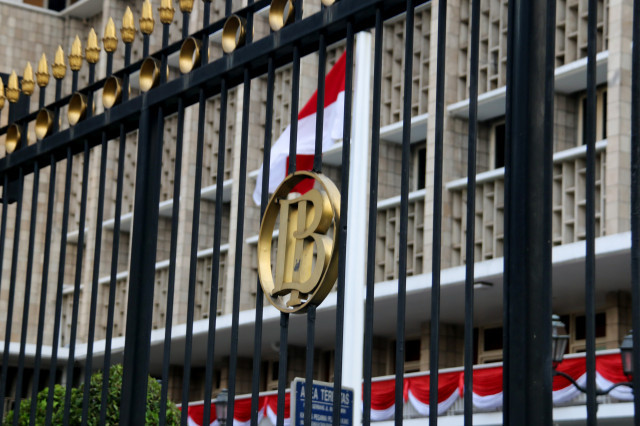Popular Reads
Top Results
Can't find what you're looking for?
View all search resultsPopular Reads
Top Results
Can't find what you're looking for?
View all search resultsIndonesia’s foreign exchange reserves soar to $130.5b in May
BI reported Rp 18.67 trillion ($1.33 billion) in net inflows, mainly in sovereign debt papers, from the second week of May to the first week of June.
Change text size
Gift Premium Articles
to Anyone
 The logo of Bank Indonesia (BI) is seen in front of the central bank's building in Jakarta. Indonesia’s foreign exchange (forex) reserves rose to US$130.5 billion in May thanks to the government’s new debt issuance and increased forex levels stored by banks at the central bank, BI announced Monday. (JP/Rafaela Chandra)
The logo of Bank Indonesia (BI) is seen in front of the central bank's building in Jakarta. Indonesia’s foreign exchange (forex) reserves rose to US$130.5 billion in May thanks to the government’s new debt issuance and increased forex levels stored by banks at the central bank, BI announced Monday. (JP/Rafaela Chandra)
I
ndonesia’s foreign exchange (forex) reserves rose to US$130.5 billion in May thanks to the government’s new debt issuance and increased forex levels stored by banks at the central bank, Bank Indonesia (BI) announced Monday.
The current reserves level, an increase of $2.6 billion from April’s level, is estimated to be sufficient to support eight months of imports and payment for the government’s short-term debts, according to the central bank.
It is also deemed to be above the international adequacy standard of about three months’ worth of imports and the highest reserves level since January before the coronavirus pandemic upended the country’s economy and the rupiah exchange rate.
“Bank Indonesia considers the reserve assets position able to support the external sector resilience and maintain macroeconomic and financial system stability,” the central bank said.
“Going forward, Bank Indonesia views that the reserves remain adequate, supported by the stability and upbeat outlook of the domestic economy.”
BI Governor Perry Warjiyo said on Friday that the reserves would increase in May, supported by global economic recovery as foreign investors started to flock back into Indonesian assets.
“A huge amount of capital inflow will boost the forex reserves level,” the governor said, adding that the relatively better financial market conditions compared to three months ago reduced the need for the central bank to conduct a market intervention.
The central bank reported Rp 18.67 trillion ($1.33 billion) in net inflows, mainly in sovereign debt papers, from the second week of May to the first week of June. From April 1 to May 14, BI recorded $4.1 billion in net inflows.
A foreign-induced recovery in the financial market has buoyed the country’s currency as the rupiah rebounded almost 17 percent since the end of March to reach Rp 13,877 per US dollar on Monday, Bloomberg data show, erasing most of the losses it recorded in the first three months of the year amid fears of the outbreak.
Meanwhile, the government has sold Rp 420.8 trillion ($30 billion) worth of sovereign debt papers this year as of May 20 and will sell another Rp 990.1 trillion before the end of the year, according to the Finance Ministry data, as it moves to fund the battle against the economic fallout from the coronavirus crisis.
The government will raise the much-needed funds by selling sovereign debt papers in the domestic market, selling retail bonds worth around Rp 40 trillion to Rp 50 trillion, offering global bonds worth around $4 billion to $7 billion, among other measures.
The government expects a widening budget deficit of 6.34 percent of gross domestic product (GDP), an increase from earlier estimates of 6.27 percent in May and 5.01 percent at the end of March, as the government prepares to spend Rp 677 trillion to combat the pandemic.
“Going forward, we see that risks from the ongoing COVID-19 pandemic, while declining, will remain, leaving some uncertainty in the financial market,” said Bank Mandiri chief economist Andry Asmoro. “We also see that there will be a delay in inflow of foreign direct investment as the global value chain has been seriously damaged.”
However, imports tend to decelerate more than exports due to a halt in production and investment activities, he went on to say. “It may shrink the current account deficit, which will support Indonesia’s forex reserves in 2020.”









